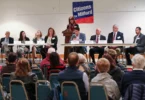By Zoe Allen, Ryan Noel, Joe Pohoryles, Youmna Sukkar and Jack Thornton
Boston University News Service
Earlier this month, world leaders from more than 100 countries met at the United Nations’ annual Climate Change Conference, dubbed “COP26,” in Glasgow, Scotland. Lasting from Oct. 31 to Nov. 12, the conference’s key outcome was the Glasgow Climate Pact agreement, which marked the first time a United Nations Climate Conference agreement directly called to reduce global coal and fossil fuel use.
The conference called for attending countries to accelerate “efforts towards the phase-down of unabated coal power and inefficient fossil fuel subsidies, recognizing the need for support towards a just transition.”
The agreement initially called for a “phase-out” of coal power, until negotiations later in the conference saw the delegation from India, a prominent producer and consumer of coal, push to alter the agreement’s language.
The conference also saw an acknowledgment that the damage developing nations face as a result of climate change is disproportionate to their pollution emissions.
The pact includes an agreement to establish a mechanism to aid countries who have been impacted by climate change events, calling on developed nations to double their collective funding to developing nations through 2025 to help them adapt to environmental changes.
More than 100 countries also pledged to reverse deforestation by 2030. The pledging countries make up about 85% of the world’s forests, and include world powers such as the United States, China and the United Kingdom, alongside nations with high deforestation rates such as Brazil and Indonesia.
Twenty-four governments from developed countries also teamed with car manufacturers such as Ford, General Motors and Mercedes-Benz to pledge that all new manufactured cars and vans be carbon emission-free by 2035 in leading markets, and 2040 globally.
Notably, nations with major auto industries, such as the United States, Germany and Japan did not agree to this pledge, nor did manufacturers such as Volkswagen, Toyota and Nissan.
The conference acknowledged the pledges and agreements as a step forward rather than the completion of a goal. Countries were called on to revisit their emission reduction plans by 2022 to ensure they are doing their part to ensure the global climate rises to no higher than 1.5 degrees Celsius, as set out by the Paris Agreement in 2015.
Here’s what local leaders, activists and experts had to say about the outcomes of the summit.
Elizabeth Turnbull Henry, President, Environmental League of Massachusetts
Elizabeth Turnbull Henry, who serves as the president of the Environmental League of Massachusetts, said that the key takeaway of COP26 for her and many of her colleagues in other state and local environmental advocacy organizations is that “we can’t count on help from on high here.”
“As much as we need global cooperation and binding global targets, we also need state-based and local progress to prove that a transition is possible and the path to doing so is in a way that is equitable and creates economic opportunity across society,” Turnbull Henry said. “The rules about the pledges on methane are good progress. There’s good things that came out of it, for sure. But I think overall … we are not on track to meet any sort of science-based goal and the implications of not doing so are stark and will have ramifications for all of us and particularly those that are least equipped to deal with that.”
Turnbull Henry also spoke about the role of wealthy nations both in creating emissions and mitigating them going forward.
“I remember seeing an article in The Guardian … that said the top one percent emits twice as many emissions as the bottom 50% from an income standpoint,” she added. “And so, it is really disappointing that we’re not seeing the kind of bold and frankly moral leadership from countries with means to do so.”
Jonathan Waldmann, Political Lead in Sunrise Boston and Senior at Milton High School
Jonathan Waldmann serves as a political lead for Sunrise Boston, a chapter of the nationwide youth movement whose goal is to stop climate change while also creating millions of green jobs. Waldmann echoed Turnbull Henry’s sentiments that the events in Glasgow proved that local work is more vital than ever.
“COP26 demonstrated, above all else, that drastic action required to avert climate catastrophe will be brought about via grassroots organizing rather than top-down diplomatic and legislative efforts,” he said.
In his view, the most positive outcome of the climate conference was “the resurgence of the United States as a global leader on climate after four years of burning diplomatic bridges and climate denial under President Donald Trump.”
He also said that it was promising that the pact signed at the conference explicitly pledges to reduce reliance on coal and spend additional money mitigating the impacts of the climate crisis in the developing world.
However, he said, the measures agreed to at COP26 do not go anywhere near as far as they must to avert climate disaster.
“There has been a consensus among experts that the pledges contained within the pact do not go far enough to hold us to the 1.5-degree Celsius mark within the Paris Agreement,” Waldmann said. “This, above all else, is a reminder that those in power cannot be trusted to save our future. The climate revolution began in communities rather than in Congress, and that is where it must continue going forward.”
Joan Fitzgerald, Professor of Urban and Public Policy at Northeastern University
Joan Fitzgerald, an urban and public policy professor at Northeastern University, said the agreement will help cities and towns to serve as climate leaders in the United States. As an example of a town leading on climate, Fitzgerald pointed to Brookline’s efforts to keep fossil fuel hookups out of new buildings.
“Now that you’ve got an international agreement saying we have to phase out fossil fuels, that totally changes the environment in which cities operate,” Fitzgerald said.
Fitzgerald also mentioned Mayor Michelle Wu’s climate policy for Boston, pointing to her “Free the T” plan as a policy that will help curb Boston’s carbon emissions.
“Boston’s already made big moves on building efficiency, and [Wu] will continue to make big moves,” Fitzgerald said. “Boston is really going to become a leading city for climate action with her as mayor.”
Fiona Broadie, Member of Divest BU
Boston University students are also taking initiative when it comes to climate change. Divest BU is a coalition whose goal is to get Boston University to divest from fossil fuels. Fiona Broadie, a member of the group, shared their thoughts on COP26.
“I thought the COP26 summit was a big loss, overall, but it had a lot of little victories within it,” Broadie said.
Those victories were countries vowing to stop deforestation by 2030, which will be “85% of the world’s remaining forests,” according to Broadie.
China and the U.S. vowed to cut down fossil fuel emissions, including methane, which has never before been mentioned at a climate summit.
One speaker at the conference that stood out to Broadie was indigenous activist Txai Surui, from Brazil. The 24-year-old gave spoke on how climate change was affecting her home in the Amazon Rainforest.
“Today the climate is warming. The animals are disappearing. The rivers are dying and our plants don’t flower like they did before,” Surui said at the climate summit.
A big loss is that world leaders and diplomats fail to acknowledge that impoverished countries need more economic support. These countries are feeling the greatest effects of climate change, yet they are not the ones responsible. Although the two biggest polluters, China and the U.S., vowed to cut fossil fuel emissions, they will be doing so over the next decade.
Broadie emphasized the urgency that world leaders need to take in order to help stop climate change, as “we do not have a decade.” They also explained that those making these decisions are often older and wealthier, which makes it harder for them to personally feel the effects.
“It’s going to affect us young people, our futures, and it’s currently affecting impoverished people and people in places like the Amazon rainforest,” Broadie said.








